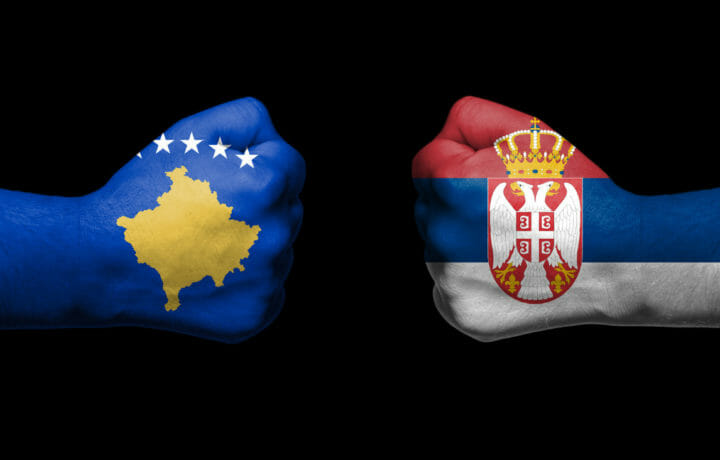Protesters were angry about a new rule to start on August 1, forcing all people entering Kosovo with Serbian IDs to replace them with a temporary document during their stay. The Kosovar government is also requiring ethnic Serbians who have registration plates issued by Serbia to change them to Kosovo license plates over the next two months.
Outraged Serbians emplacing roadblocks and subsequently shooting at authorities, forced Kosovo Police to shut two border crossings. Spokesperson for the North Atlantic Treaty Organization (NATO) led international peacekeeping force KFOR (Kosovo Forces) said the current situation is tense, but they are prepared to intervene if necessary.
After the police closed the border crossings with Serbia on Sunday, Kosovo’s government consulted with the EU and US ambassadors. Later Sunday evening, authorities in the capital city of Pristina decided to delay implementation of the new border rules until September 1. Joseph Borell, European Union (EU) foreign policy chief, welcomed Pristina’s decision and urged demonstrators to remove all roadblocks immediately.
Kosovo and Serbia’s History
Kosovo, which is predominantly inhabited by Albanians, broke away from Serbia in 1999 and declared its independence in 2008. During the break away, the United Nations (UN) Security Council placed Kosovo under a transitional UN administration (UNMIK) and authorized KFOR. An estimated 250,000 Serbians and Serb forces departed Kosovo during this period. Peace-keeping forces worked to calm retaliatory attacks against Serbian cultural sites during the return of hundreds of thousands of Kosovo Albanian refugees, to their homes.
Even though recognized by more than 100 countries, Serbia does not recognize Kosovo and continues to lay claim to the territory. And 15 other UN member states do not recognize the Republic of Kosovo either, including Russia and China.
Serbia
Local media reported air raid sirens were heard near the Kosovo/Serbian border as Kosovo restricted border crossings. Early Sunday, Serbia’s Defense Ministry alleged the Kosovar government has an ongoing disinformation campaign with fake social media accounts, adding the Serbian Army had not “in any way entered the territory of Kosovo.”
Late Sunday night, Serbia’s President Aleksandar Vucic tried to calm the situation, calling for dialogue to resolve the issue peacefully with Kosovo. As tensions simmered, Vucic stated Serbia is working to restore calm on the Serbian border and is calling for discussions.
With some saying Serbia is Russia’s last friend in Europe, the war in Ukraine has made Russia’s influence in Serbia even more obvious. Recent polls show only 26 percent of Serbs blame Moscow for the invasion, while most believe the West and Ukraine are the reason for the war. Belgrade refuses to condemn and join EU sanctions against Russia, with Serbian media continuing to propagate the Kremlin’s version of events. Determined to preserve its special relationship with Serbia, last month Presidents Putin of Russia and Vucic reached a gas agreement that secured Serbia another three years of Russian gas price, several times lower than the current price in the EU.
Russia
With the war in the Ukraine and the surrounding politics, Kosovo’s border closing did not go unnoticed by Moscow. Russia called on Kosovo, the U.S. and EU to halt all ‘provocations,’ and respect the Serbs in Kosovo. The Kremlin believes Kosovo’s new rules on personal documents and license plates for local Serbs is another step toward expelling all Serbians from Kosovo. Maria Zakharova, Russia’s Foreign Ministry spokeswoman, stated yesterday, ”Such a development of events is more evidence of the failure of the mediation mission of the European Union.”
Kosovo and KFOR
Albin Kurti, Kosovo’s prime minister, blamed the Serbian President Vucic for increasing tensions and a possible border conflict between Serbia’s Army and the Kosovar police, while denouncing fear and threats in neighboring Serbia.
A press release by NATO on Sunday stated KFOR was ready to intervene if stability is jeopardized in Kosovo, in accordance with its mandate from the UN Resolution 1244. The press release further acknowledged full support of the normalization process between Pristina and Belgrade through EU-facilitated dialog.
With the Ukrainian war and tensions between East and West at their highest in years, last month Kosovo stated that it would make an official application to join the EU at the end of the year. EU brokered talks between Serbia and Kosovo began over a decade ago, but have failed to achieve normalization.



